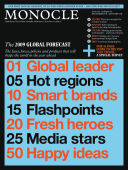
Issue 19
The 2009 Global Forecast: The faces, forces, policies and products that will shape the world in the year ahead.
In This Issue
Oops! No content was found.
Looks like we no longer have content for the page you're on. Perhaps try a search?
Return Home

